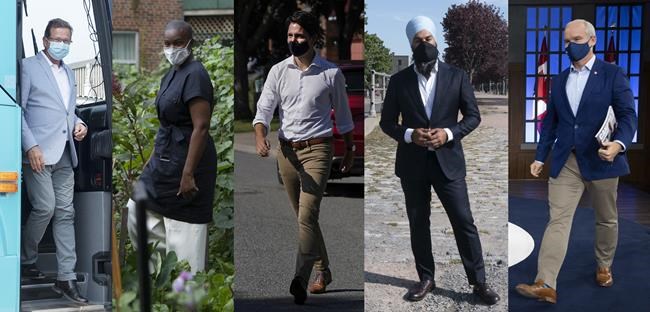Mock debates and simulations prepare leaders to fend off predicted attacks
Advertisement
Read this article for free:
or
Already have an account? Log in here »
To continue reading, please subscribe:
Monthly Digital Subscription
$0 for the first 4 weeks*
- Enjoy unlimited reading on winnipegfreepress.com
- Read the E-Edition, our digital replica newspaper
- Access News Break, our award-winning app
- Play interactive puzzles
*No charge for 4 weeks then price increases to the regular rate of $19.00 plus GST every four weeks. Offer available to new and qualified returning subscribers only. Cancel any time.
Monthly Digital Subscription
$4.75/week*
- Enjoy unlimited reading on winnipegfreepress.com
- Read the E-Edition, our digital replica newspaper
- Access News Break, our award-winning app
- Play interactive puzzles
*Billed as $19 plus GST every four weeks. Cancel any time.
To continue reading, please subscribe:
Add Free Press access to your Brandon Sun subscription for only an additional
$1 for the first 4 weeks*
*Your next subscription payment will increase by $1.00 and you will be charged $16.99 plus GST for four weeks. After four weeks, your payment will increase to $23.99 plus GST every four weeks.
Read unlimited articles for free today:
or
Already have an account? Log in here »
Hey there, time traveller!
This article was published 08/09/2021 (1562 days ago), so information in it may no longer be current.
OTTAWA – The secret to success in election debates is anticipating attacks and preparing “memorable” one-liners, according to political experts who have prepared former party leaders for head-to-head battles.
They said surviving the experience and avoiding “being left in the dust” or looking “like a deer in the headlights” should be a key aim of leaders, warning that a meltdown during a debate can torpedo an entire election campaign.
The Liberals, Conservatives, NDP and Greens have all conducted mock debates on simulated sets, with party staff standing in as rival party leaders.

Experts, who have prepared leaders in previous and current debates, say they rehearse down to the smallest minutiae, including how they look from different camera angles.
The Canadian Press spoke to a number of former staff who helped prepare leaders in previous elections, including Dan Nowlan, a strategist who played Liberal Leader Justin Trudeau in mock debates to prepare former Tory leaders, including Stephen Harper and Andrew Scheer.
Nowlan said he got into character as Trudeau watching hours of debates and interviews and rehearsing his best lines so he gave an authentic performance.
He says staff are instructed to closely study opponents’ “best selves,” and to bombard their party leaders with difficult questions from a podium, just like in a real debate.
Rehearsals of the debates are usually filmed to see how party leaders’ responses come across, as well as their key messages.
Karl Bélanger, a former national director of the NDP who helped a number of past leaders prepare for election debates, says the leaders must not appear surprised by questions or criticism.
“You need to know what the likely lines of attack will be. They need to anticipate what the other leaders could say. The response is rehearsed so they are not surprised — to avoid the ‘deer in the headlights’ phenomenon,” Bélanger, president of Traxxion Strategies, said. “You don’t want your leader to be flat-footed.”
Nowlan said sounding fluent and well-informed was the point of rehearsals. But most party leaders were fixated on just surviving the experience.
“The goal for everybody is just to get through it,” he said.
Bélanger added: “The most important thing is to come out on top. The second is not to be the guy who lost it completely. Surviving the debate is key.”
Some debate simulations are conducted in the evening, with cameras on a set that resembles the actual debate locations, to make rehearsals as authentic as possible.
“They always video it so the candidate can see themselves. They will practise segments at a time — topics, or a batch of topics. You would also do a full run through. The point is to make it as realistic as possible,” Nowlan said.
Where the leaders stand is decided by ballot. Being near the centre and next to the incumbent prime minister — so they can take them on directly — can keep a leader in the game. Those at the far end risk being marginalized.
Leaders try to get their main points, including policy and attacks on their opponents, out early on in the debate.
“Most people only watch the first 10 minutes of the debate,” Nowlan said.
The official French-language debate between the party leaders took place Wednesday and covered climate, the cost of living, public finances, Indigenous issues, justice, foreign policy and the pandemic.
It will be followed Thursday night by the English-language debate, also at the Canadian Museum of History in Gatineau, Que.
This report by The Canadian Press was first published Sept. 8, 2021.


















